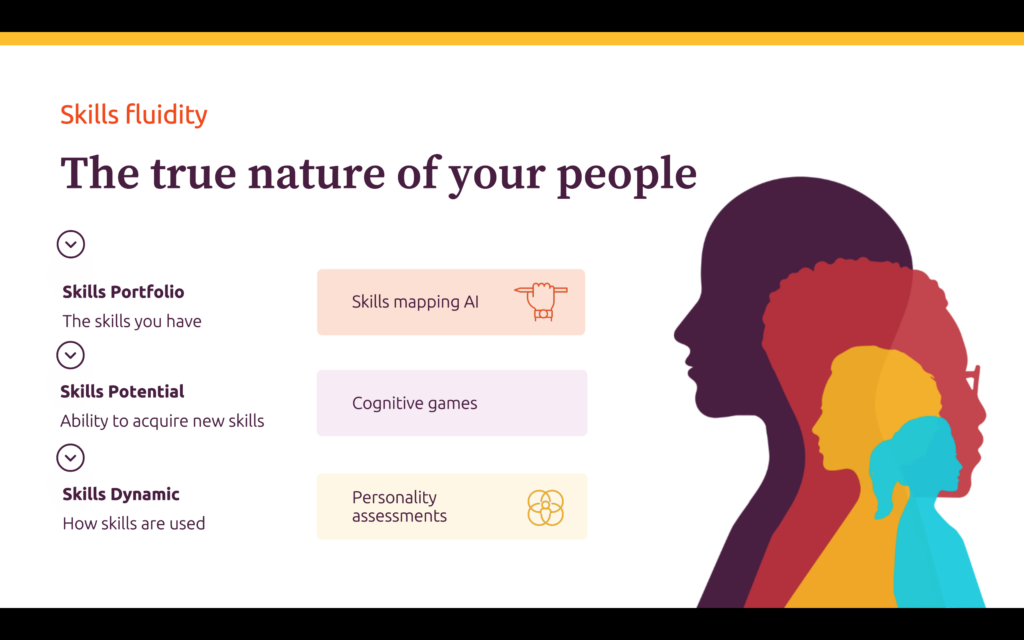How to create a sustainable and personalised skills strategy at scale
Recently our CGO Dr Jared Skey was invited to speak at a Human – People & Culture hackathon, which involved a panel of top HR professionals.
The debate that followed was an inspiring discussion about how we view the evolving world of work, and how to enable people to move freely around businesses based on skill.
You can watch a full recording of the talk and discussion here:
Food for thought – highlights of the discussion and further reading
The panel Q&A was an insightul discussion on how we define skills, the value of different skills, and how we prevent workers being boxed into “swim lanes”.
This led to bigger ideas on enabling young people to understand the work that is suited to them, and the creation of a universal talent marketplace – where individuals own their own data and create thier own fluidity.
Panelist Sharon Frost – Global HRD at Oxford Pharmagenesis – summarised these thoughts: “It is our job as employers to make sure that we really articulate the fluidity, how you can evolve your personal skill-set and how you can evolve your career. Because that brings about so much enrichment to all parties”
Assigning people to problems, not jobs and silos.
The panel discussed a company-wide approach to skill. The idea that instead of of job silos, we need to hire people into a fully interconnected marketplace, based on skill. Allowing individuals to move more freely between tasks instead of forcing them into “swim lanes”.
Panelist Fiona Williams – HR Director at Buro Happold – explained that throughout her career she has heard people saying “stick to your swim lane”. She thinks that “forcing you to be defined by a job description is so demotivating”
Panelist Donald MacRae – HRD EMEA at Starbucks – pointed out that instead, if we assign budgets and people to problems, and get the right skill sets, we “get into a more inclusive and diverse way of working”
This approach is discussed in the book “Work with out jobs”, by Ravin Jesuthasan and John W. Boudreau. A recommended read for anyone interested in this way of thinking.
Skills hierarchies and transferability
Panelist George Stone – Director of HR at Shields – raised the thought provoking questions: “If somebody’s good at one thing, why are they good at it? Why is it a skill of theirs? What are the components that make that up? What is building those skills?”
This led to a discussion on skills hierarchies. For example, having a skill such as Java script programming, is a proxy for a deeper set of core skills such as: critical thinking, logical reasoning, task switching. Skill-sets that might well be applicable to a completely different field such a cooking!
If we can properly understand these core skills and hierarchies, we can open up true skills fluidity and transferability.
This concept has opened up a lot of interesting discussion here at Cognisess. We plan to write more on the topic soon. Watch this space… thank you George for inspiring these thoughts.
Hard verses soft skills
Panelist Donald MacRae – HRD EMEA at Starbucks – said that in his experience “The difference between success and failure has often been on the softer skills.” He went on to say that “a lot of people have the skills or knowledge but how do you deploy them in a working situation?”
This led to a discussion on how hard skills and knowledge are just the table stakes. If you don’t look at how people behave you only understand them theoretically.
Behavior is where skills get put into practice.
In Jared’s talk he said that defining the skills people have is the first piece of the puzzle. To get the best out of workforce skills, you need to understand the following about all your people:
- Skills Portfolios – the skills they have today
- Skills Potential – their ability to acquire new skills
- Skills Dynamics – how they put their skills to use

You can read more about the vital interplay between hard and soft skills in our blog post: “Enter the Skills Matrix”
Individual development
Panelist Steve Farmer – MD at SPIE Build & Connect – raised the idea of using skills assessment to help young people find the right career paths “school leavers would do an aptitude test and it would say – ‘you would be really predisposed to [insert career]’ … it would throw out the kind of skills you can pick up to make you very marketable based on your own innate abilities”
This idea is exactly something we are working on at Cognisess. We are launching a version of our website, called Yondur, where any individual can play any of our games and assessments for free; to understand the work that is suited to them. No strings attached.
You can watch a video about creating the Yondur brand here:
Or visit the Yondur site here.
And in this blog post: “Sustainable Job Satisfaction for all” you can read more about why, at Cognisess, we think it is hugely important to help as many people as possible find sustainable job satisfaction, and how we are going about achieving this goal.
Thank You
A huge thank you to all the panelists for taking part in this inspiring discussion. And to Amy Stephenson – MD of Human – People & Culture – for setting it all up.
We thoroughly recommend listening to Amy’s insightful weekly podcast: The Human CEO
If you would like to find out more about the work we are doing at Cognisess and how we can help drive skills fluidity in your organisation, please do get in touch.
Sign up to our Newsletter
Keep up to date with a collection of articles, resources and insights for people hiring, managing and developing your people.



